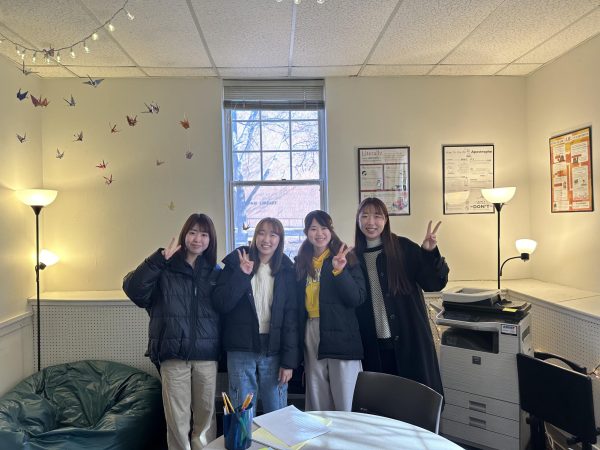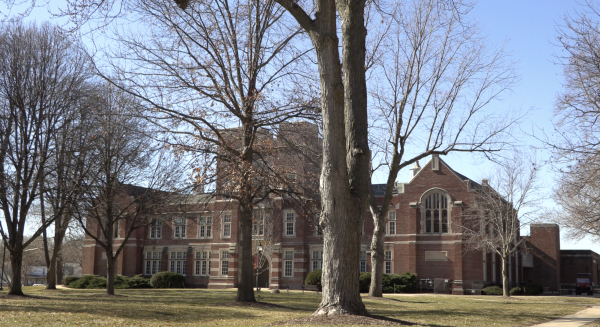Former Sen. Alan Simpson: “There’s no trust in Congress”
April 2, 2014
Former U.S. Senator Alan Simpson has been called many things. The Washington Post’s Aaron Blake referred to him as ‘the greatest quote machine in politics’. Simpson recalled during Thursday’s lecture being called “a baby-killing queer-loving son of a bitch” and being named by The Advocate as one of the “ten coolest straight guys in America” for his support for gay rights.
Simpson, a Wyoming Republican, can add another title to the list: speaker for the 2014 Culver Lecture at Simpson College.
During an interview with The Simpsonian and again in his speech, he called both political parties out on the “nastiness” of partisan play and touched on the 2010 Simpson-Bowles deficit reduction proposal (crafted with Democrat Erskine Bowles), student involvement, and why the government used to work.
What follows are a few of his answers edited for length during an interview before his speech.
In an interview with the Des Moines Register, you say young people should care about national debt because it’s growing (up $17.3 trillion). How will that affect us everyday?
- Forget the nastiness of Obamacare and all the nasty stuff. We (the Simpson-Bowles proposal commission) gave reasons and procedures on how to restore solvency in social security for 75 years and to do something with healthcare because it’s two-thirds of the American budget and no politician will touch it. It’s not about you, it’s about everybody. You’re going to waddle up to the window in the year 2033 and get a check for 25 percent less. And who is telling us that? The trustees of the system, Democrats and Republicans alike. You don’t want to count on the AARP to do anything for you, they’re not interested in you.
What challenges are presented when working bi-partisan in the Senate? How do you overcome them?
- The president by executive order appointed Erskine Bowles, a Democrat, and me as co-chairmen, and five Democrats and five Republicans (do deficit commission). It took us about three months in our commission to establish trust, because there’s no trust in Congress. They don’t even trust others in their own party. It’s Shakespeare. Once we established trust, we got things done and we said, “Here’s what you have to do with the big things.”
You also mention in the Register article Missouri Sen. Todd Akin’s ‘legitimate rape’ comment, among others. Do you think those comments hurt Republican support among college students?
- They cremate us! You gotta be a madman. And then you got a guy in Indiana who talked about, “Well, if there was a pregnancy created by a rape, that would be God’s will, too.” We lost four races there because of inane, stupefying statements by people who don’t know anything about government; they just know that they’re rigid. And I say they’re rigid as a fireplace poker, but without the occasional warmth.
Many students only hear about policymakers who make these comments in the news. Who in Washington should they really pay attention to?
- I wish I could tell you. Leadership is almost a lost cause, what we found, Erskine and I. If you’re a leader, you’re taking a ton of criticism. No one like criticism. As for me, I’ve been called everything. Real names. F-words and stuff. Ugly. But I can just say that there’s not a great deal of leadership. Leadership is not a contemporary things, and that’s certainly in both parties.
How can students stay informed about policy decisions in Washington?
- Don’t they still have town meetings here? You go to one of those, and when the person gets up from either party and says, “I know this is a terrible problem, but I am going to solve it for you without touching precious Medicare, precious Medicaid, precious defense and precious Social Security,” you should rise and as an intelligent student say, “You, sir, or ma’am, are giving a terminological inexactitude.” That’s what you should say, and they’ll look at you and you should just say, “You’re lying to us.” You can’t do what you have to do, you can’t grow your way out of this, you can’t cut spending your way out of this hole and you can’t tax your way out of this hole. You have to use a blend.
How can students interested in going into public policy best prepare for those types of careers?
- Do your homework and get in the game. Go run for the city council when you get out of here, or the school board. Get involved in something; don’t just carry a sign and wander around with paint on it. Heaven’s sakes, when I was your age I didn’t care about anything going on. Now you’ve got so many things out there that need to be corrected, but you can’t do it without doing your homework.
What do you want students to take away from the Culver Lecture?
- You want to take way that young people see that we used to work together. Did John Culver and I agree on everything? No, we did not. But I trusted him. I trusted him when he said, “I think your bill is a piece of junk.” Then I knew that he meant that. And he was very clear about that. Now you’ve got guys who say, “Well, I think I can help you,” and they’re never there, they’re all wishy-washy, they won’t make the hard choices. Come away and see that the government used to work, and that we’re saddened, I’m saddened to see a dysfunctional government, which is headed for a debt that we can’t pay.















